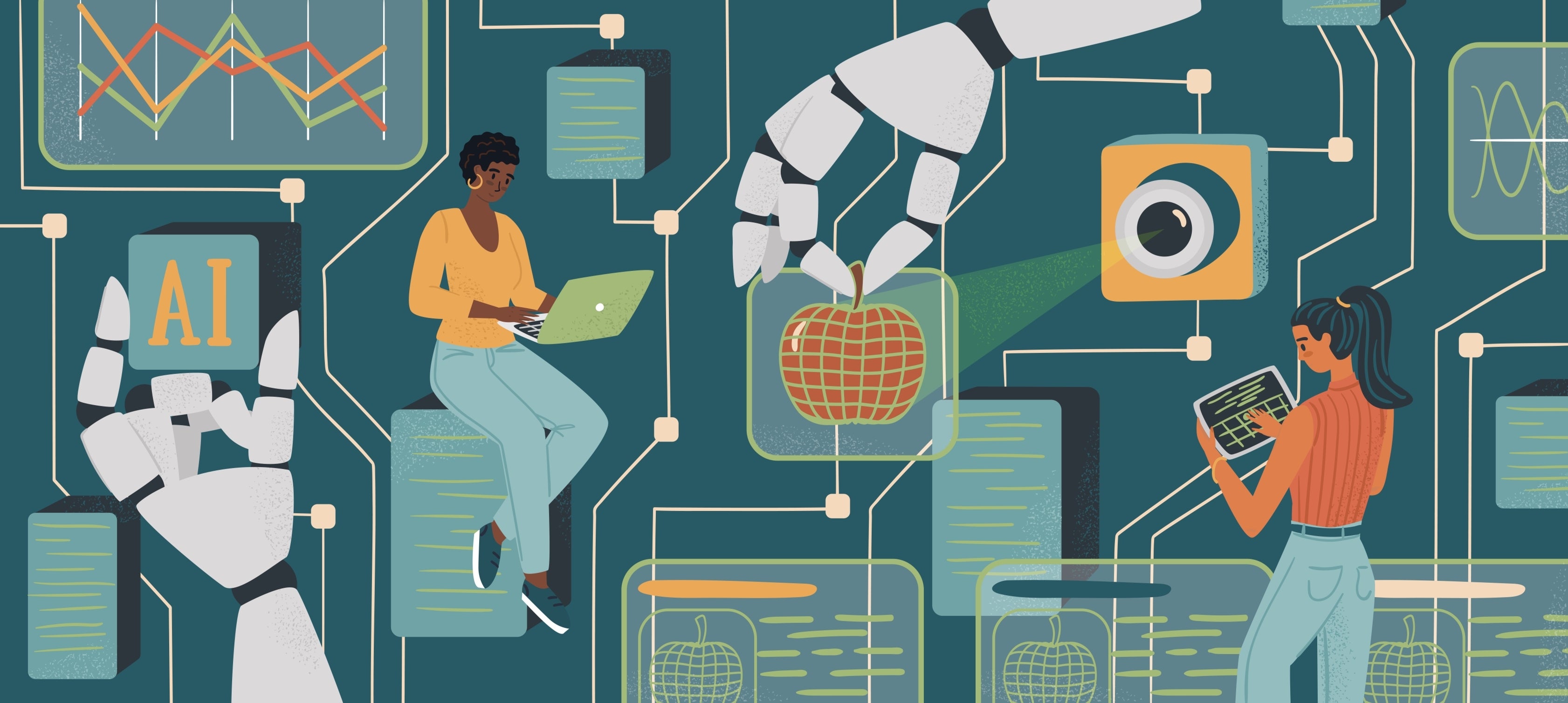Banner artwork by ECO LENS / Shutterstock.com
Cheat Sheet
- Competitive advantage. India’s skilled workforce, high-quality data, and thriving startup culture are key strengths.
- Role of in-house. Counsel must stay informed of evolving regulations, ensure data privacy, and establish governance guidelines.
- Impact on legal industry. AI can streamline certain tasks but cannot replace human empathy, creativity, and judgment.
- Key recommendations. Transparency, public education, and ethical AI practices are focal points for stakeholders.
Global AI development: Setting the stage
The development of artificial intelligence (AI) has witnessed remarkable growth and attained significant global importance in recent decades. AI involves the emulation of human intelligence in machines, enabling them to think, learn, and solve problems akin to humans. It encompasses various subfields, including machine learning, natural language processing, computer vision, robotics, and more.
India possesses significant competitive advantages in AI, including a skilled workforce and talent pool, emphasis on skill development, market potential and economic factors, an entrepreneurial culture and startups, data availability and quality, and international collaborations.
Strategy for in-house counsel
In-house counsel hold a pivotal role in steering organizations through the challenges posed by AI disruption. Their primary strategy involves staying well-informed about AI technologies and their legal implications. This awareness empowers them to work in collaboration with relevant teams, assessing the potential risks and benefits associated with AI adoption.

Establishing clear governance policies that dictate how AI should be utilized within the organization is crucial, ensuring alignment with existing compliance frameworks. Equally important is the meticulous compliance with data privacy regulations, especially when AI systems handle sensitive data. When dealing with AI vendors, due diligence should be rigorous, with contracts clearly outlining responsibilities and liabilities.
To safeguard intellectual property, strategies for protection, such as patent applications or trade secret safeguards, should be devised. Ethical AI usage is emphasized, promoting fairness, transparency, and impartiality in AI design and application. Employee training in AI-related legal and ethical matters is essential to ensure that the workforce is well-versed in their responsibilities concerning AI. Continuous monitoring of evolving AI regulations is imperative, and incident response plans should be in place to swiftly address any AI-related disruptions or breaches.
Balancing AI efficiency with human judgement
Artificial intelligence is revolutionizing sectors across the economy, including the legal industry. In the field of legal education and practice, AI is bringing about transformative changes, bolstering efficiency, and expanding the capabilities of legal professionals. This technology holds the promise of streamlining processes, advancing research and analysis, widening access to justice, and elevating the overall practice of law.
Contract review and data extraction
AI has emerged as a valuable tool for improving performance in routine and mechanical legal tasks. Processes such as information and document discovery, which traditionally consumed significant time and resources, can now be handled more efficiently through AI technology. Tasks like due diligence, which typically take hours or days, can be expedited with the assistance of AI-powered tools.
For instance, legal technology company Lawgeex offers contract review services where legal documents are redlined based on instructions provided to the system. Similarly, ClearLaw enables lawyers to access and extract vital data from historical contracts, facilitating accurate categorization and reducing the likelihood of errors while enhancing service delivery.
AI has emerged as a valuable tool for improving performance in routine and mechanical legal tasks.
AI tools are also proving beneficial in standardizing form contracts and managing contracts efficiently. By automating these tasks, lawyers can save time that can be better invested in advisory work and the development of legal strategies.
Can AI replace human lawyers?
The idea of AI replacing human lawyers has been extensively debated, but it is important to recognize that AI cannot completely replace lawyers. While AI can provide valuable assistance in tasks like legal research and document review, it lacks the essential qualities of empathy and creativity that only humans possess. These qualities are particularly crucial in areas such as client interaction, negotiation, and developing innovative legal strategies.

In reality, AI is designed to complement and enhance the capabilities of lawyers. It allows them to focus on more complex and intellectually challenging tasks while providing them with data-driven insights to support their decision-making process. AI is not intended to replace lawyers, but rather to empower them. Machine learning algorithms can analyze vast amounts of data, identify patterns, and make predictions. However, the interpretation and application of the law requires human judgment.
Harmony between lawyers and AI
The legal field is known for its dynamic and nuanced nature, characterized by intricate language, historical context, and ethical responsibilities. Artificial intelligence plays a valuable role in enhancing legal work but falls short in replicating the depth of understanding and context provided by human experts.
AI's primary function within the legal profession is to complement human efforts. It excels at automating routine tasks. However, its limitations become evident when it comes to comprehending the broader context of legal issues. In the realm of legal research, AI can swiftly retrieve relevant cases and statutes, yet it may not fully comprehend the evolving nature of legal doctrines, historical context, or regional nuances.
It is essential to view AI as a tool that complements human expertise, streamlining processes such as contract management and due diligence, thereby allowing lawyers to concentrate on essential matters.
Furthermore, AI lacks the ethical judgment that human lawyers possess. Lawyers are entrusted not only with providing legally sound advice but also with upholding ethical standards. AI, in contrast, cannot make value judgments, potentially resulting in morally questionable legal strategies. It is essential to view AI as a tool that complements human expertise, streamlining processes such as contract management and due diligence, thereby allowing lawyers to concentrate on essential matters.
While artificial intelligence holds the potential to bring about significant transformations in various sectors of Indian society, such as healthcare, education, law enforcement, transportation, and agriculture, it also raises several ethical challenges and implications that must be carefully considered and addressed. AI utilizes algorithms to perform tasks that traditionally require human decision-making, learning, expertise, and other forms of intelligence, aiming to mimic human behavior and intelligence.
Transparency and accountability concerns
As AI becomes more pervasive in society, it is essential that the decision-making processes of these systems are transparent and open to public scrutiny. In some instances, AI has been employed within the Indian legal system without adequate transparency. This lack of transparency can erode public trust in the judicial system, and decisions made by AI systems may be challenged due to a lack of transparency. It is critical to ensure that the use of AI in the legal system is transparent and that the decision-making process of these systems can be explained and understood.

Undoubtedly, the integration of AI into the Indian legal system holds the potential to enhance efficiency and accuracy. However, questions of accountability and transparency must be effectively addressed to ensure the ethical and equitable deployment of AI.
Recommendations to stakeholders
- Foster education and public awareness: To address concerns and promote understanding, it is crucial to educate the public about AI. This can be achieved through awareness campaigns, workshops, and educational programs, dispelling fears of job replacement and highlighting the capabilities and potential benefits of AI.
- Establish data sharing and usage regulations: Regulations governing data sharing and usage are essential to protect privacy, ensure ethical practices, and maintain transparency in AI development. By establishing clear guidelines, governments can create a framework that promotes responsible data handling and protects individuals' rights.
- Develop global standards and regulatory frameworks: The absence of global standards for AI poses a challenge. Governments and international organizations should collaborate to establish common frameworks that address regulatory aspects of generative AI. This includes defining accountability measures, mitigating bias, and implementing safety protocols.
- Encourage self-regulation: In addition to governmental regulations, individuals and corporations involved in generative AI development should adopt self-regulatory practices. This includes clarifying the purpose of each model, promoting ethical guidelines, and fostering responsible use of AI technologies to ensure public trust and confidence.
- Prioritize bias mitigation: While it may be challenging to eliminate bias completely, efforts should be focused on mitigating bias in generative AI models. Developers should invest in research and development of bias detection and mitigation techniques to ensure fair and unbiased outcomes, reducing the potential for discriminatory or unfair practices.
- Explore augmentation of human intelligence: Generative AI tools have the potential to augment human intelligence and improve productivity across various sectors. Encouraging research and development in using generative AI as a tool to enhance human capabilities can lead to innovative solutions and advancements in fields such as healthcare, education, and creative arts.
- Foster collaboration and interdisciplinary approaches: The development of generative AI models requires collaboration among researchers, developers, policymakers, and domain experts. Encouraging interdisciplinary approaches and fostering collaboration can lead to a comprehensive understanding of the societal impacts and potential risks of generative AI, enabling informed decision-making and responsible development.
- Address ethical concerns: Given the intellectual capacity of generative AI, it is crucial to address ethical concerns and potential misuse. Developers should proactively consider the ethical implications of their models and work towards preventing harm or unintended consequences, promoting responsible and ethical AI practices.
- Support accessibility and inclusivity: Generative AI has the potential to benefit individuals with communication difficulties or disabilities. Encouraging the development of inclusive AI solutions that cater to the needs of diverse populations, such as speech-impaired individuals or autistic individuals, can lead to improved communication tools and increased accessibility.
- Emphasize safety and control: As generative AI advances, safety and control measures must be prioritized. Collaboration between governments, organizations, and developers is necessary to establish safeguards that prevent malicious use or unintended consequences. Ensuring that the technology is harnessed for the benefit of society while minimizing risks and maximizing safety is of utmost importance.
- Monitor future enhancements: It is important to stay vigilant about future enhancements to deep learning models that require less training. Assessing the implications of these advancements, including potential risks and unintended consequences, will help ensure responsible and safe development and deployment of generative AI technologies. Ongoing monitoring and evaluation are necessary to adapt regulations and practices accordingly.
India’s AI odyssey: The path ahead
India stands on the threshold of an AI revolution, and it is essential for all stakeholders, spanning government, industry, and the legal community, to work collaboratively in harnessing the immense potential of AI while effectively mitigating associated risks. By doing so, India can not only secure its position as a significant AI player but also make a substantial and enduring contribution to the global AI ecosystem.
Disclaimer: The information in any resource in this website should not be construed as legal advice or as a legal opinion on specific facts, and should not be considered representing the views of its authors, its sponsors, and/or ACC. These resources are not intended as a definitive statement on the subject addressed. Rather, they are intended to serve as a tool providing practical guidance and references for the busy in-house practitioner and other readers.




